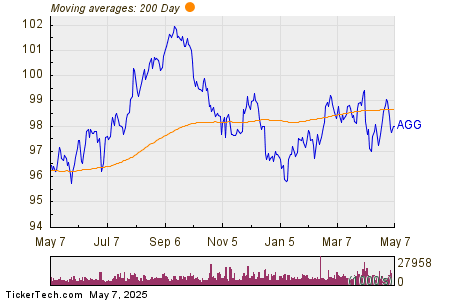Impact of Trump’s Policies on Major Stocks After 100 Days
April 29 marked the 100th day of President Trump’s second term. This period has seen significant changes in the U.S. economy and stock market.
The Trump administration has implemented new tariffs, resulting in notable volatility in major indexes. Concerns about a potential recession have increased, and stocks from the “Magnificent Seven,” which previously led market gains, have experienced downturns.
Investment Challenges for Key Stocks
Despite overall struggles for the Magnificent Seven stocks, President Trump’s policies have particularly impacted two of them. Could a turnaround be on the horizon?

Image source: Getty Images.
Tesla’s Struggles Amidst Declining Sales
Tesla (NASDAQ: TSLA) has faced the most significant decline among the Magnificent Seven, down 31% year to date and 34% since Inauguration Day.
Several factors are contributing to Tesla’s challenges. Shareholders have grown increasingly frustrated with CEO Elon Musk’s dual role leading the Trump administration’s Department of Government Efficiency (DOGE) and how this intertwines with his business decisions.
Additionally, Tesla has seen a drop in vehicle deliveries, decreasing 13% year over year in Q1—the largest decline in its history. Revenue fell by 9%, while net income plummeted 71% from the previous year. In contrast, competitor BYD’s revenue surged by 36% in the same period.

Data by YCharts.
Without $595 million in regulatory credit sales, Tesla would have reported a loss in Q1—its first since early 2021. Despite the current difficulties, Musk remains optimistic about the company’s future with plans for a substantial robotaxi network, although regulatory challenges remain a hurdle.
The volatility surrounding Tesla’s stock means it could recover, but investors should proceed with caution until there are signs of growth or clearer plans for the robotaxi initiative.
Amazon’s Mixed Outlook in a Changing Trade Environment
Amazon (NASDAQ: AMZN) has seen a lesser decline at 15% year to date and 18% since Inauguration Day.
Investors are particularly concerned about how Trump’s trade policies may impact Amazon’s e-commerce operations, as many third-party sellers rely heavily on Chinese imports. New tariffs may lead to higher prices for consumers, but this might not be a long-term issue as policies can change rapidly.
On the other hand, Amazon Web Services (AWS) remains largely insulated from these tariffs. Although AWS contributed only 19% of total revenue in Q1, it accounted for an impressive 63% of operating income.

Data by YCharts.
AWS boasts a robust client base, which positions it for steady growth, despite slower expansion than competitors like Microsoft‘s Azure and Google Cloud.
With a price-to-earnings (P/E) ratio of 30, Amazon’s stock is not considered cheap, but it aligns with valuations of other Magnificent Seven companies, including Apple and Microsoft. Many analysts remain optimistic about Amazon’s long-term recovery, though investors might need to be patient.
Conclusion
In summary, while the Trump administration’s policies create challenges for major players like Tesla and Amazon, opportunities may still exist for long-term investors willing to navigate volatility.
The views and opinions expressed herein are the views and opinions of the author and do not necessarily reflect those of Nasdaq, Inc.


